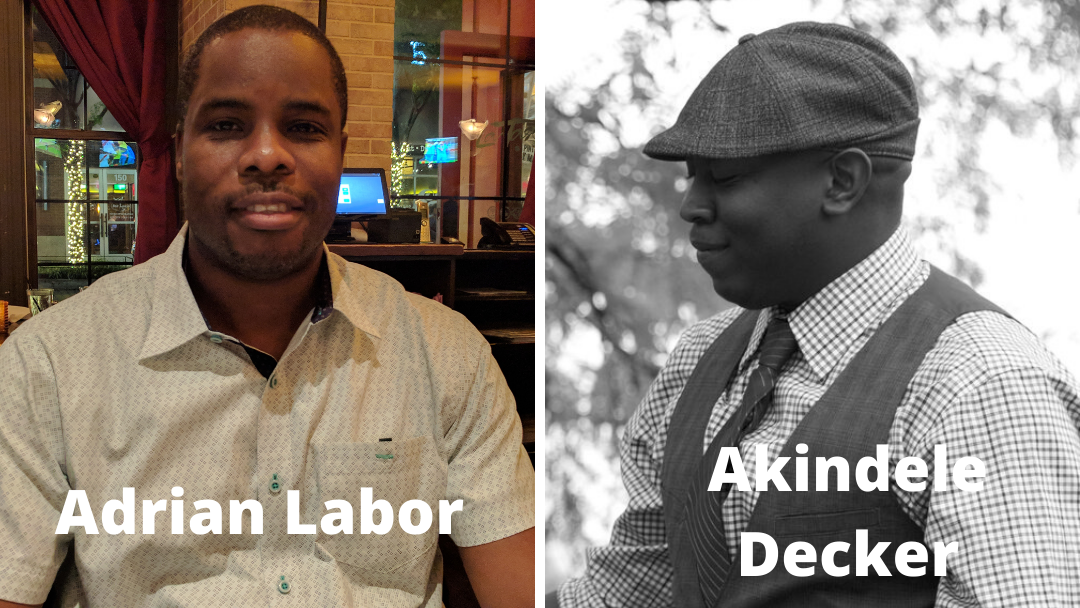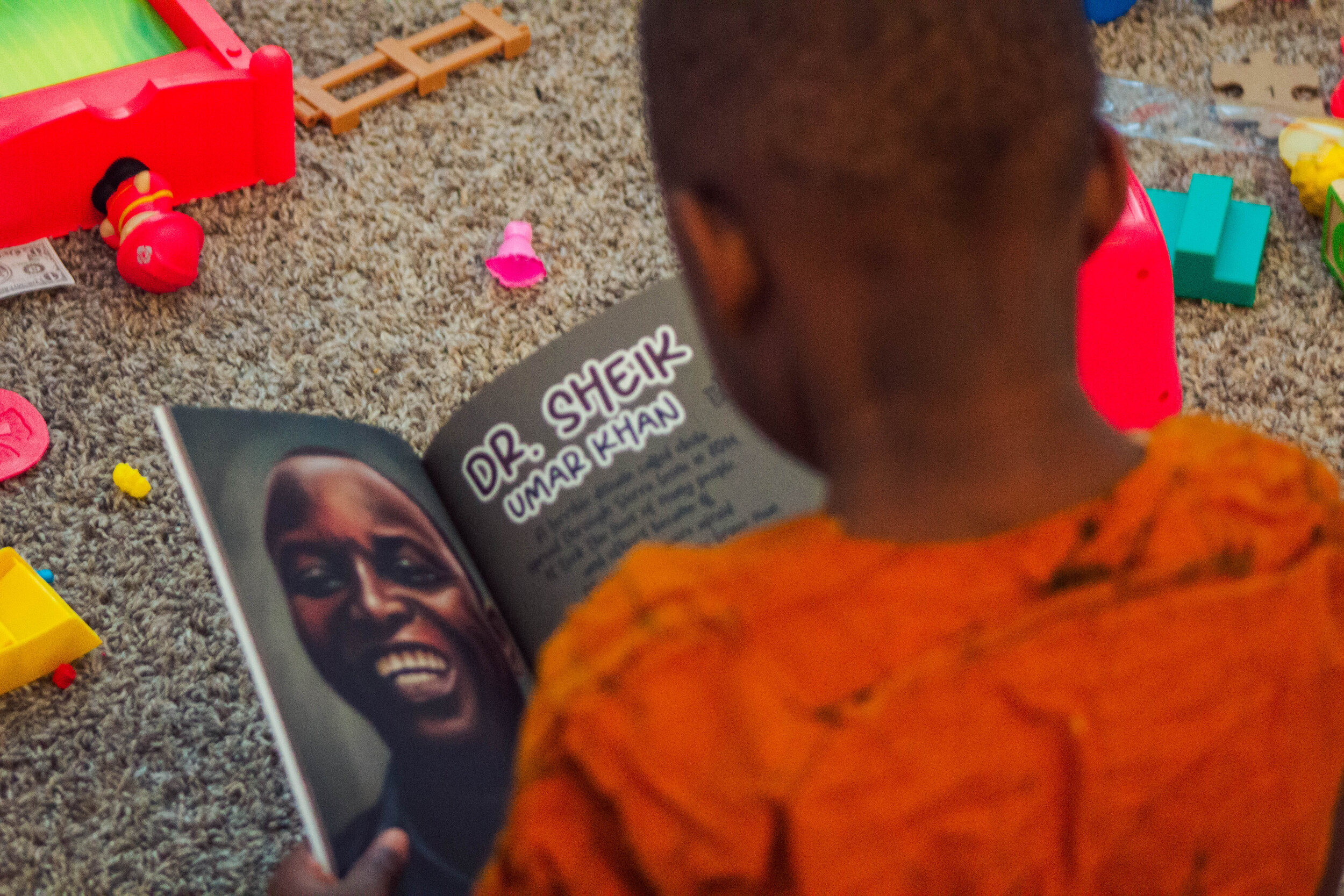African Picture Book Author Spotlight: Akindele Decker and Adrian Labor
Meet Sierra Leonean children’s book author Akindele Decker and Adrian Labor
These two friends embarked on a journey to children’s book authorship that did not follow the traditional path.
While Akindele has been a writer for over two decades, his craft of choice was poetry. Adrian, on the other hand, is a Civil Engineer practicing in Sierra Leone and the US.
But it’s their shared passion for history and Sierra Leone which led them to curate the children’s book, 20 Icons of Sierra Leone Who Shaped History. This book is the first in a collection of books they plan to write about Sierra Leonean icons.
I asked Akindele and Adrian to share their story and journey to becoming a children’s book authors. They discuss their writing, their advice to new children’s book authors, and exciting new projects.
For some background, tell us a bit about yourself. Where are you from and what you do?
Akindele: My name is Akindele Decker. I am a poet and writer born in Sierra Leone. Although I have been writing as long as I can remember, when I was 15 years old, I published my first poem, "What If.”
My Sierra Leonean heritage influences my poetry and covers topics dealing with the middle-passage, identity, and African history. In 2004, Akindele received an Editors Choice Award for Outstanding Achievement in Poetry from the International Library of Poetry. Since then he has conducted numerous poetry workshops worldwide and has had his work featured in various publications.
Adrian: I am from Freetown, Sierra Leone. I am passionate about history and with my own family history tied to Zion Methodist Church in Freetown established in March 1792 by the Nova Scotian/Black Loyalist settlers. After high school, I pursued a degree in engineering. Gradually I learnt of the history in which my ancestors journeyed through these same places and left a legacy for two hundred years ago. Today, I balance both interests in engineering and African diaspora history.
When did you first become interested in writing for children? Did you always know you wanted to write African heritage books?
Adrian: I began a family tradition of sharing an article at the end of the year with my extended family, which recounts historical connections and highlights contributions to my paternal and maternal ancestors. His most recent article was about events in the 1790s that led to the establishment of Freetown. The title was “Last Christmas in Nova Scotia, America and their Hopes of Better and Brighter New Year in Sierra Leone, Africa.”
Akindele: I have always been intrigued by history; the many experiences people have encountered throughout the human journey. My passion for writing for children is inspired by my grandfather, Thomas Decker, a former playwright and Journalist in Sierra Leone. Growing up, I remember reading the book of folktales my grandfather wrote, Tales of the Forest, and years his Krio translation of Shakespeare's Julius Caesar. These and a strong passion for history and genealogy fueled my desire to write African heritage stories to children and young people.
What have been the challenges to writing, publishing and marketing an African heritage book?
Writing the picture book, 20 Icons of Sierra Leone Who Shaped History, was not without its challenges. One key challenge was determining the authenticity and accuracy of historical sources. We discovered that much of the work written so far are those of Western Academics who primarily draw their references from primary accounts of Colonial officials and missionaries who travelled through Sierra Leone.
Sierra Leonean Historians such as Dr. Arthur Abraham, in recent times, were more critical of these sources and made part of their work dedicated to telling the local histories and stories of Sierra Leone told by Sierra Leoneans themselves. Another challenge was access to valuable resources, such as primary sources. We found out that many of these are archived in foreign institutions such as the British Library Museum, British National Archives, and other places. While some are accessible digitally, many are catalogued in these institutions, meaning that one needs to travel to these places to get information. This was a challenge logistically, though it can also be a challenge for local Sierra Leoneans. They may not have the means to travel but still have the interest to learn about their histories and explore primary sources. It is incredible how many of the resources that tell or store our history, aren't owned or operated by us. Going the self-publishing route was an initial challenge that we're still processing but not as challenging as before.
Unlike a traditional publishing route, we had to practically do everything ourselves, including creating the book design, formatting, editing, and now marketing. We are truly grateful to certain individuals who, without their help with editing the book, we would certainly have had a much less quality production with unlooked errors. We reached out to family members who are very prominent educators and some historians and writers who offered their time to edit various parts of the book. To them, we are eternally grateful.
Did you have any fears or self-doubts when writing an African heritage children’s book? What were they, and how did you overcome them?
As first-time self-published authors, one of our greatest fears was not being familiar with the publishing process, from start to finish. We knew what we wanted to accomplish, a book for children to learn more about their history. We took a leap and wrote, based on many months of research and discussions with each other and others about the content. We wanted to include so much in this book, but without much knowledge of what could be included or referenced, we played it safe whenever we could. We also wanted to make sure our voice represented Sierra Leoneans’ eager to learn about these Icons’ history. For us, this meant telling a story grounded on diversity; telling the stories of Icons not only from the western part of Sierra Leone but as many regions of the country as we could cover.
What advice do you have for authors writing African heritage children’s books?
Don't be afraid to tell your heritage stories. We have many stories that need to be told, that haven't yet, or even if they have been, they haven't been told enough. Approach the telling of African stories with a contemporary mindset, understanding that technology plays a role in transmitting stories and history in this technology-driven age.
What is your favourite African heritage children’s book?
Akindele: Its "Tales of the Forest" by Thomas Decker. It remains a gateway to nostalgic thoughts about childhood in Sierra Leone. Folktales have a way of bridging a path between generations in a way that other stories don't. I cherish characters of Bra Spider, Bra Tortoise and others, way more than I do Disney or Cartoon Network characters.
Any advice on how people can encourage children to read more diverse books?
It has to start somewhere, but more-so somewhere local! Conversations about family history can help children position themselves within the histories of their ancestors. This could help expand their interests and encourage them to learn more about stories outside of their immediate environments. Knowing that ancestor, relative, or someone they can identify with served in World War II, may lead them to want to learn about that era, or along with the nations involved and the impact that history had on their lives today. Also integrating technology into the practice of reading may have an impact. Send them books to read that they can store on their mobile devices. Sometimes it isn't enough to give children books; they have to see and hear about these characters and stories outside of the print world.
What are you working on next? Are there any other African heritage children’s books that you have written?
This is the 1st edition of Sierra Leone Icons; we are also working on other editions that focus on specific disciplines such as Education and the Arts. We would love to see them as part of public and private school curriculums and available in libraries in Sierra Leone.
Three Fun Facts:
Akindele runs a business called Basket of Ajo that offers apparel and home decor products with inspirational messages about African identity.
Adrian is a Civil Engineer in Maryland USA and has worked in Canada, Senegal, Costa Rica and the Ivory Coast.
Akindele and Adrian have been friends for over 10 years.
Connect with Akindele and Adrian: INSTAGRAM | WEB | RESEARCH SITE | BOOK



